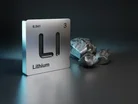Rio Tinto Targets Arcadium Lithium in EV Battery Push

In a significant move into the battery metals market, global mining house Rio Tinto is in talks with lithium producer Arcadium Lithium. The potential acquisition marks Rio Tinto's effort to expand its presence in the EV sector, which relies heavily on Lithium for battery production.
Rio Tinto's strategic shift towards Lithium
Rio Tinto, part of Anglo Australia, is known for its diversified operations across metals and minerals. It is exploring the acquisition of Arcadium Lithium as part of its broader strategy to capture a larger share of the EV battery metals market. With headquarters in London, Rio Tinto has long been a dominant player in mining minerals such as iron ore, aluminium and copper.
It has operations across six continents and annual revenue surpassing US$55bn.
Jakob Stausholm, Chief Executive, Rio Tinto has publicly acknowledged the company's interest in lithium acquisitions, emphasising the importance of securing resources critical to the energy transition, stating:
"We maintain an active interest in the lithium sector," Stausholm said a interview. The move highlights Rio Tinto's commitment to staying ahead of the growing demand for battery metals, driven by the global shift to EVs.
Arcadium Lithium: A key player in EV supply chains
Arcadium Lithium, a leading lithium producer formed from the 2023 merger of Allkem and Livent, has garnered significant interest due to its extensive operations. It has production facilities in Argentina, Australia and Canada and maintains processing plants in strategic markets such as China, the United States and Japan.
As demand for EVs rises, so does the need for Lithium, a critical component in rechargeable batteries that power not only EVs but mobile phones, laptops and other electronics. According to the World Economic Forum, each EV battery requires approximately eight kilograms of lithium carbonate equivalent, highlighting the essential role that companies like Arcadium play in supporting the automotive industry.
Market reactions and concerns
Rio Tinto's interest in Arcadium Lithium signals a positive step towards securing critical resources. However, not all market analysts view the timing as ideal.
Michael Teran, Deputy Portfolio Manager at Blackwattle Investment Partners, expressed caution regarding the potential deal. He suggested that Rio Tinto's approach might be opportunistic, given recent fluctuations in lithium prices. He remarked, indicating that the current market environment could affect the deal's perceived value:
"Rio Tinto would need to propose a valuation near US$8bn to deliver value to shareholders."
Arcadium's share price had declined by 60% before the news of Rio Tinto's interest, with its market capitalisation standing at US$3.3bn before the talks became public.
The downturn in lithium prices, driven by increased supply, has caused hesitation among investors regarding the actual value of Arcadium in the short term.
Impact on the automotive industry
Arcadium Lithium is a major supplier to the world's largest automotive manufacturers, including Tesla, BMW, Toyota and General Motors. Industry forecasts position Arcadium to become the third-largest lithium producer globally by 2027, a crucial factor as the automotive sector grapples with lithium supply shortages.
The shift towards EVs created uncertainty regarding the availability of essential materials like Lithium, which are necessary to meet future demand.
Rio Tinto's potential acquisition of Arcadium comes when the lithium industry faces global challenges.
Ken Brinsden, CEO of Patriot Battery Metals, recently commented on the West's need to reduce its reliance on China for lithium supply. He stated:
"The West must wrest control of the lithium supply chain from China by turning its high-quality resources into a long-term competitive advantage."
Ken's concerns are rooted in the current low lithium prices, which threaten the development of new mines and the industry's long-term stability.
Future outlook
As Rio Tinto navigates its proposed acquisition of Arcadium Lithium, the outcome will have significant implications for the global lithium market and the broader EV supply chain. While the financial details remain undisclosed and the deal is still in a non-binding phase, the potential acquisition highlights the critical role that Lithium will play in the future of transportation and energy.
With industry analysts forecasting rising demand for battery metals, Rio Tinto's move represents a strategic effort to secure its position in the fast-growing EV sector.
The success of this acquisition could reshape the competitive landscape, particularly as Western countries strive to reduce their dependence on China's lithium supply.
Make sure you check out the latest edition of EV Magazine and also sign up to our global conference series - Sustainability LIVE 2024.
EV Magazine is a BizClik brand.


